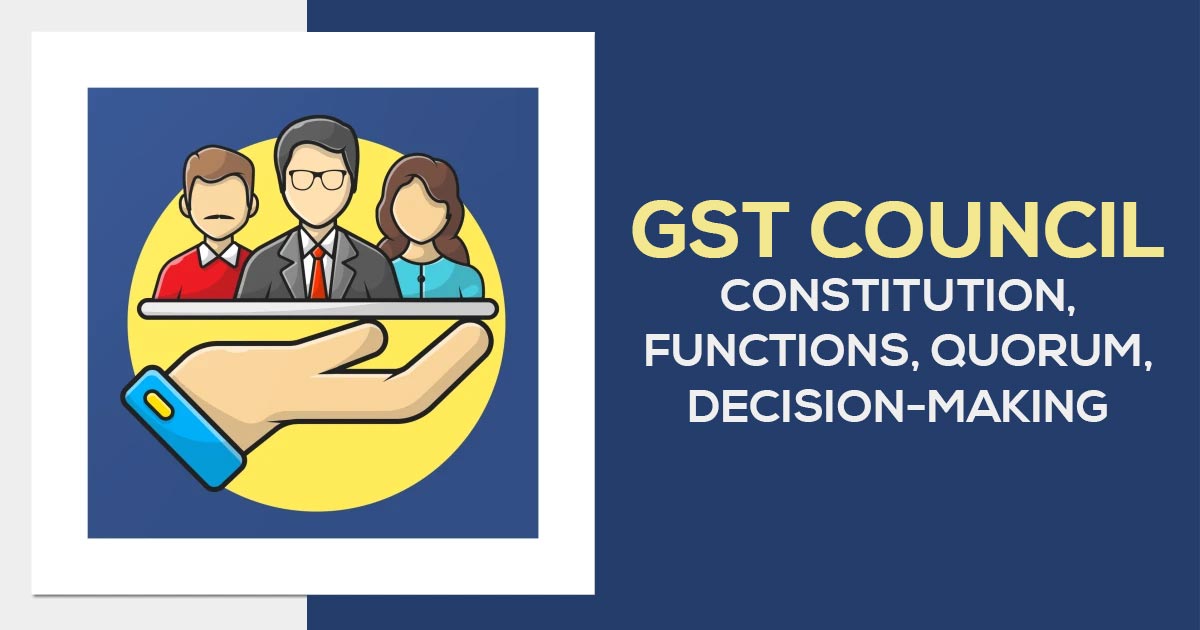
GST council is a governing body to regulates and directs every step for the implementation of goods and service tax in the nation with decisions over tax rates and further implementation measures. GST council assimilates suggestions and regulations into one form and improvises the changes formally through notifications and circulars with its departments and finance ministry.
Latest Updates
- GST Council required to reconstitute three GoM since new ministers have been selected from 11 states such as Andhra Pradesh, Bihar, Chhattisgarh, Haryana, Madhya Pradesh, Mizoram, Odisha, Rajasthan, Sikkim, Telangana, and Tripura.
Establishment of the GST Council
The notification regarding the establishment of the GST Council was issued on Saturday the 10th day of September 2016 and the provisions came into force on Monday the 12th day of September 2016.
Article 279A having provisions regarding the establishment of the GST Council was inserted after Article 279 of THE CONSTITUTION (ONE HUNDRED AND FIRST AMENDMENT) ACT, 2016. The Union Finance Minister is the head of the GST Council while the First Meeting of the council was held on 22nd and 23rd September 2016 in New Delhi.
GST Council Constitution
According to Article 279A, it is on the part of the president to give the order to constitute the council of GST within 60 days from the 12th of September 2016 which is already notified by the Government.
Important: GST Council Meeting Updates: All You Need to Know
Following are the designated personnel, who will form the GST Council together:-
- The Union Finance Minister who will be the Chairman of the council;
- The Union Minister of State in charge of Revenue or Finance who will be a member of the council;
- One member from each state who is Minister in charge of Finance or Taxation or any other Minister and any one of them will be vice chairman of the GST Council who will be mutually elected by them.
Note
- The Secretary of the Revenue Department will work as EX-Officio Secretary to the GST Council,
- The Chairperson of the Central Board of Excise and Customs will be the permanent invitee in all the proceedings of the GST Council who will not have voting rights.
Quorum and Decision-Making
- For a valid meeting of the members of the GST Council, at least 50 per cent of the total number of members should be present at the meeting.
- Every Decision made during the meeting should be supported by at least 75 per cent majority of the weighted votes of the members who are present and voting at the meeting. In “article 279A” a principle is there which divides the total weighted vote cast between the Central Government and State Government:-
- The vote of the Central Government shall have the weight of one-third of the total votes
- The votes of the State Government shall have the weight of two-thirds of the total votes, cast in the meeting
- Any act, decision or proceedings shall not be declared invalid based on any remaining deficiency at the time of the establishment of the GST Council i.e.
- if there is any vacancy remaining in the Council
- if there is any defect in the constitution of the Council
- if there is any defect in the appointment of a person as a member of the Council
- if there is any procedural non-compliance.
Main Functions of the GST Council
The GST council will be supposed to make the recommendation to the Union and State on the following matters:-
- Principles of levy, model Goods and Services Tax Laws, the appointment of Goods and Services Tax levied on supplies in the course of Inter-State trade or commerce under article 269A, and the principles that govern the place of supply;
- For raising resources during any natural calamity or disaster, or any special rate or rates for a specified period, to raise additional.
- On subsuming various taxes, cess, and surcharges in GST.
- Details of services and goods that will be subjected to GST or which will be exempted from GST.
- On the Threshold limit below which, services and goods will be exempted from GST.
- On GST rates including floor rate with bands of GST and any special rate for the time being to arrange resources to face any natural calamity.
- Making special provisions for the following states: Arunachal Pradesh, Assam, Jammu and Kashmir, Manipur, Meghalaya, Mizoram, Nagaland, Sikkim, Tripura, Himachal Pradesh and Uttarakhand.
- On model law on GST, the Principal of levy of GST and the principles which will govern the Place of Supply.
Supreme Court’s Decision on GST Council
The Supreme Court is against the GST Council over its multiple decisions and has given some sides towards the central and state governments with the verdict that the government are not bound to apply the decision given by the council and can have their own version of the decisions as per their own conditions. The bench of Justice DY Chandrachud has given the verdict recently to clear the air over the decisions by the GST council which were taking a toll on the central as well as the state government. Read more